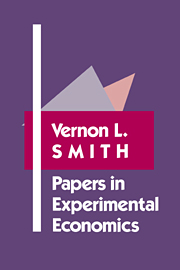Book contents
- Frontmatter
- Contents
- Preface
- Acknowledgments
- Part I The Formative Years
- Part II Institutions and Market Performance
- Introduction
- 10 On Nonbinding Price Controls in a Competitive Market
- 11 An Experimental Comparison of Alternative Rules for Competitive Market Exchange
- 12 Competitive Market Institutions: Double Auctions vs. Sealed Bid-Offer Auctions
- 13 Markets as Economizers of Information: Experimental Examination of the “Hayek Hypothesis”
- 14 The Effect of Rent Asymmetries in Experimental Auction Markets
- 15 Microeconomic Systems as an Experimental Science
- 16 Experimental Economics (Reply to R. Heiner)
- 17 A Comparison of Posted-Offer and Double-Auction Pricing Institutions
- 18 Hypothetical Valuations and Preference Reversals in the Context of Asset Trading
- 19 Bubbles, Crashes, and Endogenous Expectations in Experimental Spot Asset Markets
- Part III Public Goods
- Part IV Auctions and Institutional Design
- PART V Industrial Organization
- Part VI Perspectives on Economics
18 - Hypothetical Valuations and Preference Reversals in the Context of Asset Trading
Published online by Cambridge University Press: 06 July 2010
- Frontmatter
- Contents
- Preface
- Acknowledgments
- Part I The Formative Years
- Part II Institutions and Market Performance
- Introduction
- 10 On Nonbinding Price Controls in a Competitive Market
- 11 An Experimental Comparison of Alternative Rules for Competitive Market Exchange
- 12 Competitive Market Institutions: Double Auctions vs. Sealed Bid-Offer Auctions
- 13 Markets as Economizers of Information: Experimental Examination of the “Hayek Hypothesis”
- 14 The Effect of Rent Asymmetries in Experimental Auction Markets
- 15 Microeconomic Systems as an Experimental Science
- 16 Experimental Economics (Reply to R. Heiner)
- 17 A Comparison of Posted-Offer and Double-Auction Pricing Institutions
- 18 Hypothetical Valuations and Preference Reversals in the Context of Asset Trading
- 19 Bubbles, Crashes, and Endogenous Expectations in Experimental Spot Asset Markets
- Part III Public Goods
- Part IV Auctions and Institutional Design
- PART V Industrial Organization
- Part VI Perspectives on Economics
Summary
Background and setting
Several studies soliciting willingness-to-pay (WTP) and willingness-to-accept (WTA) responses for a variety of goods have found a large disparity between these “buying price” and “selling price” measures of value (see Knetsch and Sinden, 1984, for a summary of these studies). Although utility theory is consistent with some disparity between them, scholars generally have argued that the empirical disparity in these responses is much larger than is expected from the theory. Indeed, the mean WTA values obtained in this way are frequently several times greater than the mean WTP values so obtained. These empirical results are very robust under investigations designed to determine the effect of monetary incentives, experience, and other factors on the disparity. These results cast serious doubt on the validity of utility (or demand) theory as a calculating, cognitive model of individual decision behavior.
Another related series of experimental results have established what is commonly referred to as the preference reversal phenomenon (see the survey by Slovic and Lichtenstein, 1983). This refers to the large proportion of subjects who report that they prefer item A to item B (or B to A) but whose WTP or WTA is smaller for A than for B (or larger for A than for B if they said they preferred B to A). Often A and B are prospects or gambles, but they can be any items of value to the individual.
- Type
- Chapter
- Information
- Papers in Experimental Economics , pp. 315 - 338Publisher: Cambridge University PressPrint publication year: 1991
- 1
- Cited by



